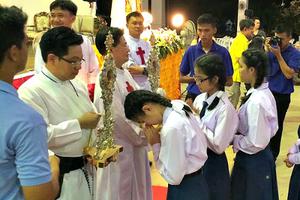Thailand’s Catholic Bishops Declare Holy Year of Prayer for a New Pentecost
The great jubilee will also mark the opening of the first plenary council of the Catholic Church in Thailand under the theme “The Disciples of Christ Live the New Evangelization,” slated to be held April 20-25, 2015.

BANGKOK — Thailand’s Catholic bishops have declared a “holy year” aimed at restoring the fervor of a New Evangelization and commemorating the 350th anniversary of the first Synod of Ayutthaya in Thailand.
The great jubilee will also mark the opening of the first plenary council of the Catholic Church in Thailand under the theme “The Disciples of Christ Live the New Evangelization,” slated to be held April 20-25, 2015.
The bishops opened the holy year by striking a gong three times during a solemn Mass on Dec. 6. The congregation consisted of priests, religious and faithful gathered at Lux Mundi, the national major seminary in the Samphran district of Thailand’s west-central Nakhon Pathom province.
During the commemorative jubilee, several faith-formation empowerment programs are under way, particularly focusing on catechesis and strengthening small Christian communities.
The first synod of the Catholic Church in Thailand was held in the former capital city of Ayutthaya in 1664.
The Vatican has also issued a commemorative stamp marking the 350th anniversary of the Synod of Ayutthaya.
Today, the Catholic population of Thailand is less than 1% of the population. Some 95% of the Thai people are Buddhist, and many of the remainder are Muslim, making interreligious relations an important facet of life for Catholics in the southeast Asian nation.
In the last 50 years, the Church in Thailand has created two archdioceses — Bangkok and Tare-Nongsaeng — on Dec. 18, 1965, and subsequently the creation of six new dioceses: Chanthaburi, Ratchaburi, Chiang Mai, Ubonratchathani, Udonthani and Nakhonratchasima.
Msgr. Andrew Vissanu Thanya Anan, executive secretary of the Thai Bishops' Conference and former Vatican undersecretary for the Pontifical Council for Interreligious Dialogue, explained the idea behind the year.
“The holy year is an opportune time of grace and compassion for rediscovering the ardor of evangelization, fruitfully accomplished by the missionaries in the past, and reconnecting to revitalize the mission of the Thai Church to the emerging challenges of today,” he told CNA on Dec. 20.
“A new Pentecost will foster [the] New Evangelization, integrating faith and culture, that will give an impetus for bolstering holistic interfaith and interreligious dialogue in the Asian context.”
Concelebrating the Mass, Archbishop Paul Tscoang In-Nam, apostolic nuncio to Thailand, read a mandate sent by Cardinal Fernando Filoni, prefect of the Congregation for the Evangelization of Peoples, that acknowledged the “pioneering efforts made by the missionaries who preached the word of God in this nation and thereby contributed to the growth of the Catholic community.”
Cardinal Filoni expressed his greetings and hope that the “holy year celebration (will) inspire a new sense of mission, which should involve the responsibility of all the Church.”
Meanwhile, the Congregation for the Evangelization of Peoples, by virtue of the special faculties granted to it by Pope Francis, granted the formal approval for the proposed celebration of the “first plenary council of the Catholic Church in Thailand,” to be held in April 2015.
Archbishop Francis Xavier Kriengsak Kovitavanij of Bangkok, president of the plenary council, presided over the Mass to open the holy year.
His homily stressed that there is a need for the “Holy Spirit that will boost the fervor of proclaiming Christ, like the early apostolic community.”
“Let us pray for a new Pentecost for renewing our New Evangelization,” Archbishop Kriengsak said, explaining that this “can be achieved by nurturing small ecclesial communities in order to renew their evangelical mission of proclaiming and living the Gospel.”
- Keywords:
- antonio anup gonsalves
- buddhism
- catholic news agency
- ewtn news
- islam
- national catholici register
- thailand














